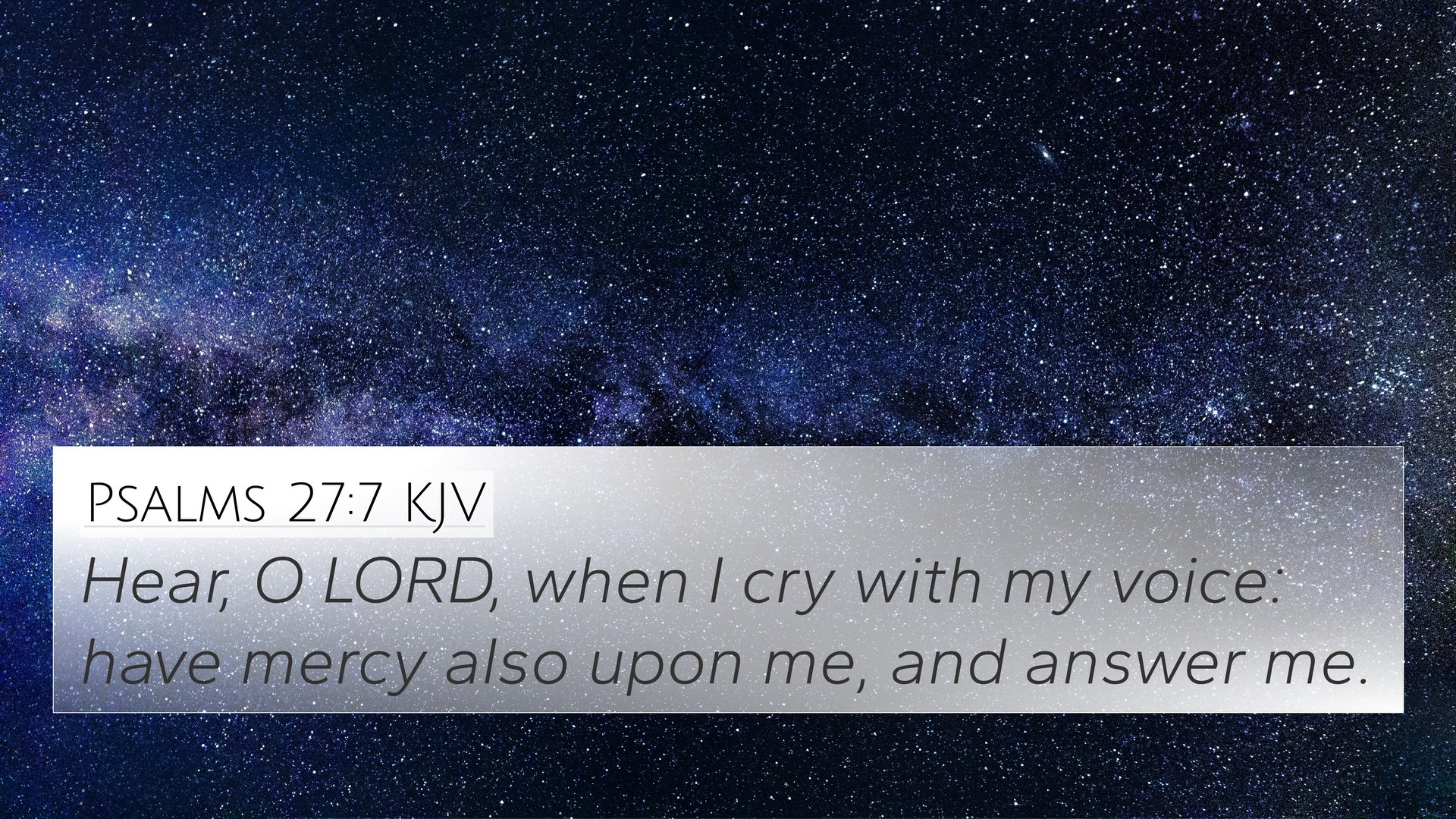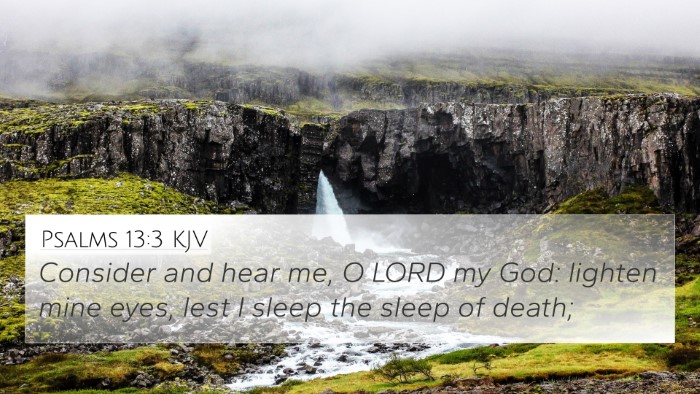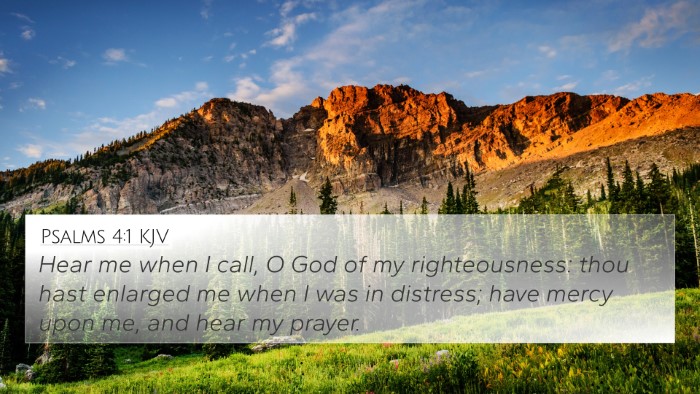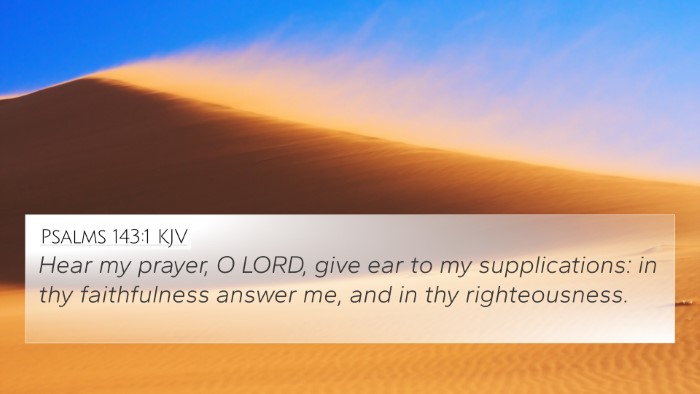Understanding Psalms 27:7
Psalms 27:7 reads: "Hear, O LORD, when I cry with my voice: have mercy also upon me, and answer me." In this verse, the psalmist expresses a profound plea to God, showcasing themes of desperation, seeking divine mercy, and the desire for communication with the Almighty. The verse is pivotal in understanding the relationship between the believer and God, emphasizing prayer as a vital conduit for expressing needs and receiving solace.
Verse Insights from Public Domain Commentaries
This verse is rich in meaning and interconnected with various themes found throughout the Scriptures. Here are insights from prominent Bible commentators:
- Matthew Henry emphasizes the urgency of the psalmist's plea. He notes that the cry is not merely a request but an intense expression of need that reflects a deep relationship with God.
- Albert Barnes highlights the intimate relationship depicted in this verse. He explains that the act of praying is rooted in acknowledgment of God’s sovereignty and the humble recognition of one's dependence on divine intervention.
- Adam Clarke delves into the emotional aspect of this request. He suggests that when the believer cries out to God, it reveals a heart burdened by troubles, seeking comfort and assurance through God's mercy.
Connections between Bible Verses
Understanding Psalms 27:7 can be enhanced through cross-referencing with other biblical texts that align with its themes. Below are several Bible verses that relate closely:
- Psalms 34:17 - "The righteous cry, and the LORD hears, and delivers them out of all their troubles." This verse reinforces the assurance that God listens to the cries of His people.
- Psalms 18:6 - "In my distress I called upon the LORD, and cried unto my God: He heard my voice out of His temple, and my cry came before Him, even into His ears." This parallels the desperation and hope expressed in Psalms 27:7.
- James 5:16 - "Confess your faults one to another, and pray one for another, that ye may be healed. The effectual fervent prayer of a righteous man avails much." This New Testament teaching emphasizes the power of prayer and connecting with God.
- Isaiah 30:19 - "For the people shall dwell in Zion at Jerusalem: Thou shalt weep no more: He will be very gracious unto thee at the voice of thy cry; when He shall hear it, He will answer thee." This illustrates God's responsiveness to prayer.
- 1 Peter 5:7 - "Casting all your care upon Him; for He careth for you." This New Testament verse reassures believers about God’s concern and willingness to respond to their pleas.
- Psalms 102:1-2 - "Hear my prayer, O LORD, and let my cry come unto Thee. Hide not Thy face from me in the day when I am in trouble; incline Thine ear unto me: in the day when I call, answer me speedily." This verse emphasizes the importance of God’s attentive ear to the prayers of those in distress.
- Psalms 86:7 - "In the day of my trouble I will call upon thee: for thou wilt answer me." This reflects the basic assurance found in the cry for mercy detailed in Psalms 27:7.
Thematic Connections
This verse can be contextualized within several themes relevant to the entirety of Scripture. The act of crying out in prayer bridges both Old and New Testament teachings on reliance upon God during times of need. Here are some thematic connections:
- The Power of Prayer: Throughout the Bible, prayer is depicted as a means to communicate with God, express needs, and seek His intervention.
- Divine Mercy: God's mercy is a recurring theme where believers call upon His compassion and grace during times of distress.
- Seeking God's Presence: The psalmist’s plea serves as an example of yearning for God’s presence and help, a theme echoed in various psalms.
- God's Assurance of Response: Multiple verses throughout the Scriptures assure believers that God hears their cries and provides answers, reflecting a consistent characteristic of His nature.
- Emotional Honesty: The emotional weight of this verse advocates for honesty in prayer, expressing genuine feelings to God.
- Affliction and Deliverance: A common biblical narrative focuses on the cycles of human affliction and subsequent deliverance through divine intervention.
Tools for Bible Cross-Referencing
Understanding the connections in the Bible can be enhanced through various tools and methods. Here are some resources for effective Bible cross-referencing:
- Bible Concordance: A reference book that lists words found in the Bible and the verses they appear in, facilitating the discovery of related passages.
- Bible Cross-Reference Guide: Guides that provide lists of correlated scriptures according to themes or topics.
- Bible Reference Resources: Various resources available both online and in print that offer thematic and verse-based connections.
- Cross-Reference Bible Study: A method of studying the Bible by tracing references to related verses for deeper understanding.
- Bible Chain References: A system of linking verses that relate to one another, typically in a thematic or doctrinal context.
Long-Tail Keywords and User Intent
When studying Psalms 27:7, individuals may seek answers to queries such as:
- How to find cross-references in the Bible - Explore techniques for locating related verses throughout the Scriptures.
- Bible verses related to prayer and divine mercy - Identify scriptures that resonate with the themes of Psalms 27:7.
- What verses are related to Psalms 27:7 - Discover specific verses that echo the sentiment of the psalmist's plea.
- Finding connections between Old and New Testament - Understanding how cross-references can highlight continuity in God’s dealings with humanity.
In summary, Psalms 27:7 is a powerful verse that speaks to the heart of prayer and the relationship between the believer and God. Its implications resonate throughout the Scriptures, providing a rich tapestry of connections and themes that encourage a deeper understanding of biblical prayer and divine mercy.







